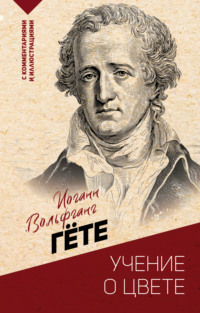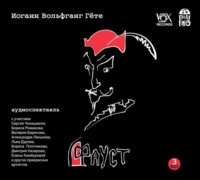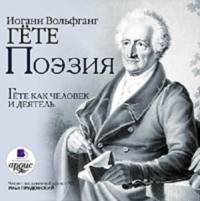 полная версия
полная версияMaxims and Reflections
In Goethe we pass, as over a bridge, from the eighteenth century to the nineteenth; but though he lived to see a third of the nineteenth century, he hardly belongs to it. Of its political characteristics he had few or none. He was no democrat. As the prophet of inward culture, he took the French Revolution for a disturbance, an interruption, and not a development in the progress of the world's history; and for all its horrors and the pernicious demoralisation of its leaders, he had the profoundest aversion. But afterwards he came to see that it had beneficial results; that a revolution is ultimately never the fault of the people, but of the injustice and incapacity of the government; and that where there is a real necessity for a great reform, the old leaven must be rooted out.3 But he knew the danger of such a process, and he indicates it here in an admirable saying: "Before the French Revolution it was all effort; afterwards it all changed to demand"; and this may be supplemented by his opinion on the nature of revolutionary sentiments: "Men think they would be well-off if they were not ruled, and fail to perceive that they can rule neither themselves nor others." And if he, had thus no theoretical sympathy with democratic movements, he had little feeling for that other great political tendency of our time – nationality; convinced as he was that interest in the weal and woe of another people is always a mark of the highest culture. But apart from politics there is one characteristic of our own time in which he fully and especially shares, if only for the reason that he did much himself to produce it; and herein he has influenced us profoundly and is influencing us still. The nineteenth century has this advantage over every preceding age, that in it for the first time honest doubt, instead of distinguishing a few, has become a common virtue. Goethe is one of the surest and safest of those who have led the transition. "We praise the eighteenth century," he writes, "for concerning itself chiefly with analysis. The task remaining to the nineteenth is to discover the false syntheses which prevail, and to analyse their contents anew." Of the aim of analysis and the proper course of inquiry, no one has given a better account than Goethe in what he says, in the words I have quoted, about active scepticism; and in the sphere of morals and religion it will perhaps be found hereafter that he has contributed, in some degree at least, to the attainment of that "conditioned certainty," for which, as we hope, all our efforts are made.
In the maxims on Literature there is some excellent criticism on literary methods, and much that may well be taken to heart by certain writers of our own day. Goethe had little but rebuke for the whole of the romantic movement, which began in his old age. The German form of it he thought unnatural, and at best a conventional imitation of an earlier period; and the French form, of which Victor Hugo was then the rising star, he thought a perversion of naturalism, an exaggeration of it until it became insipid or merely revolting. To Byron alone he gave the tribute of the most ungrudging admiration: in the opposition between classicism and romanticism, he declined to take him for a follower of either, but as the complete representative of his own time. The maxim that "the classical is health, and the romantic, disease," may not altogether commend itself to us now; but with wonderful insight Goethe foresaw the direction in which the romantic movement would lead. "The romantic," he says here, "is already fallen into its own abysm. It is hard to imagine anything more degraded than the worst of the new productions." If he could have said this two generations ago, what would he have said now? How could he have spoken without contempt of those who make all that is common and unclean in itself a subject with which literature may properly be occupied? These are the writers who profess to be realists, under a completely mistaken notion of what realism means, as applied to art; and to them the chief realities seem to be just the very things that decent people keep out of sight. They forget that in literature, as in all art, the dominating realities are the highest Ideals. As an antidote to this poison of corruption Goethe pointed to the ancient world, and bid us study there the types of the loftiest manhood. "Bodies which rot while they are still alive and are edified by the detailed contemplation of their own decay; dead men who remain in the world for the ruin of others, and feed their death on the living – to this," he exclaimed, "have come our makers of literature. When the same thing happened in antiquity, it was only as a strange token of some rare disease; but with the moderns the disease has become endemic and epidemic." Akin to these pseudo-realists, and coming under the same ban, are some of our modern novel-writers who do, indeed, avoid the depth of degradation, but try to move the feelings by dwelling in a similar fashion on matters which are not, and never can be, fit subjects of literary treatment; such as painful deaths by horrible distempers, or the minute details of prolonged operations. It is poor skill that cannot find material enough in the moral sufferings of men and women, and is driven to seek effect in descriptions of disease and surgery. Surely in any literature worthy of the name these are topics which a richer imagination and a more prolific art would have found unnecessary, and better taste would have left undescribed.
To another class of writers – those who handle a pretty pen without having anything definite to present, or anything important to say, Goethe has also an applicable word. It is a class which is always increasing in number, and tends to increase in talent. We may admit that second- or third-rate work, especially in poetry, was never before done so well as it is done now; and still we may find some useful truth in a distinction which Goethe drew for the benefit of the minor poets and the minor prose-writers of his own age. "Productions are now possible," he said, "which, without being bad, have no value. They have no value, because they contain nothing; and they are not bad, because a general form of good workmanship is present to the author's mind." In one of the many neglected volumes of his miscellaneous writings Goethe has a series of admirable notes for a proposed work on Dilettantism; and there the reader, if he is interested in Goethe's literary criticism, will find some instructive remarks in close connection with this aphorism, and also certain rules for discriminating between good and indifferent work which ought to receive the most attentive study. And the stylists who neglect plain language for a mosaic of curious phrase and overstrained epithet, may profitably remember that, as Goethe here says, "it is not language in itself which is correct or forcible or elegant, but the mind that is embodied in it."
"Translators," he tells us, "sing the praises of some half-veiled beauty and rouse an irresistible longing for the original." To them also he gives a piece of excellent advice: "The translator must proceed until he reaches the untranslatable." This is a counsel of exhortation as well as of warning. It bids the translator spare no effort, but tells him that at a certain point his efforts are of no avail. But none the less, Goethe might have added, the faithful translator must strive as if this hindrance to perfection did not exist; for it is thus only that he, or any one else, can do anything worth doing. On methods of translation much may be said, and it is sometimes urged, in a given case, that it is not literal or that it is too free. A distinguished writer has recently laid down that a translation should reproduce every word and phrase and sentence of the original as accurately as a delicate tracing reproduces the lines of a drawing. This is advice which may hold in the school-room, but, I venture to maintain, nowhere else. In so far as every language has a peculiar genius, a literal translation must necessarily be a bad one; and any faithful translation will of its nature be free. In other words, a translator will err if he slavishly adheres to mere expression; he must have complete liberty to give his author's meaning and style in the manner which he holds to be truest to the original; and so, in translating from a foreign tongue, it will be well for him to have some knowledge of his own. But he must guard against the abuse of his position: his liberty may become license, and his translation instead of being faithful may be phantastic. The translator's first and last duty is, then, to efface himself. His first duty is to stand entirely at the point of view of his author's thought; his last, to find the clearest and nearest expression in his own language both for that thought and for whatever is characteristic in the way of conveying it; neither adding anything of his own nor taking away anything from his author. The best translation is thus a re-embodiment of the author's spirit, a real metempsychosis. Nothing can be done without ideals, and this is the ideal at which the present translation aims. That it fails of its aim and has many defects, no one knows better than the translator himself; and he can only cherish the hope that where he falls short he is sometimes close to the confines of what cannot be translated.
December 2, 1892.
LIFE AND CHARACTER
I
1There is nothing worth thinking but it has been thought before; we must only try to think it again.
2How can a man come to know himself? Never by thinking, but by doing. Try to do your duty, and you will know at once what you are worth.
3But what is your duty? The claims of the day.
4The world of reason is to be regarded as a great and immortal being, who ceaselessly works out what is necessary, and so makes himself lord also over what is accidental.
5The longer I live, the more it grieves me to see man, who occupies his supreme place for the very purpose of imposing his will upon nature, and freeing himself and his from an outrageous necessity, – to see him taken up with some false notion, and doing just the opposite of what he wants to do; and then, because the whole bent of his mind is spoilt, bungling miserably over everything.
6Be genuine and strenuous; earn for yourself, and look for, grace from those in high places; from the powerful, favour; from the active and the good, advancement; from the many, affection; from the individual, love.
7Tell me with whom you associate, and I will tell you who you are. If I know what your business is, I know what can be made of you.
8Every man must think after his own fashion; for on his own path he finds a truth, or a kind of truth, which helps him through life. But he must not give himself the rein; he must control himself; mere naked instinct does not become him.
9Unqualified activity, of whatever kind, leads at last to bankruptcy.
10In the works of mankind, as in those of nature, it is really the motive which is chiefly worth attention.
11Men get out of countenance with themselves and others because they treat the means as the end, and so, from sheer doing, do nothing, or, perhaps, just what they would have avoided.
12Our plans and designs should be so perfect in truth and beauty, that in touching them the world could only mar. We should thus have the advantage of setting right what is wrong, and restoring what is destroyed.
13It is a very hard and troublesome thing to dispose of whole, half-, and quarter-mistakes; to sift them and assign the portion of truth to its proper place.
14It is not always needful for truth to take a definite shape; it is enough if it hovers about us like a spirit and produces harmony; if it is wafted through the air like the sound of a bell, grave and kindly.
15General ideas and great conceit are always in a fair way to bring about terrible misfortune.
16You cannot play the flute by blowing alone: you must use your fingers.
17In Botany there is a species of plants called Incompletæ; and just in the same way it can be said that there are men who are incomplete and imperfect. They are those whose desires and struggles are out of proportion to their actions and achievements.
18The most insignificant man can be complete if he works within the limits of his capacities, innate or acquired; but even fine talents can be obscured, neutralised, and destroyed by lack of this indispensable requirement of symmetry. This is a mischief which will often occur in modern times; for who will be able to come up to the claims of an age so full and intense as this, and one too that moves so rapidly?
19It is only men of practical ability, knowing their powers and using them with moderation and prudence, who will be successful in worldly affairs.
20It is a great error to take oneself for more than one is, or for less than one is worth.
21From time to time I meet with a youth in whom I can wish for no alteration or improvement, only I am sorry to see how often his nature makes him quite ready to swim with the stream of the time; and it is on this that I would always insist, that man in his fragile boat has the rudder placed in his hand, just that he may not be at the mercy of the waves, but follow the direction of his own insight.
22But how is a young man to come of himself to see blame in things which every one is busy with, which every one approves and promotes? Why should he not follow his natural bent and go in the same direction as they?
23I must hold it for the greatest calamity of our time, which lets nothing come to maturity, that one moment is consumed by the next, and the day spent in the day; so that a man is always living from hand to mouth, without having anything to show for it. Have we not already newspapers for every hour of the day! A good head could assuredly intercalate one or other of them. They publish abroad everything that every one does, or is busy with or meditating; nay, his very designs are thereby dragged into publicity. No one can rejoice or be sorry, but as a pastime for others; and so it goes on from house to house, from city to city, from kingdom to kingdom, and at last from one hemisphere to the other, – all in post haste.
24As little as you can stifle a steam-engine, so little can you do this in the moral sphere either. The activity of commerce, the rush and rustle of paper-money, the swelling-up of debts to pay debts – all these are the monstrous elements to which in these days a young man is exposed. Well is it for him if he is gifted by nature with a sober, quiet temperament; neither to make claims on the world out of all proportion to his position, nor yet let the world determine it.
25But on all sides he is threatened by the spirit of the day, and nothing is more needful than to make him see early enough the direction in which his will has to steer.
26The significance of the most harmless words and actions grows with the years, and if I see any one about me for any length of time, I always try to show him the difference there is between sincerity, confidence, and indiscretion; nay, that in truth there is no difference at all, but a gentle transition from what is most innocent to what is most hurtful; a transition which must be perceived or rather felt.
27Herein we must exercise our tact; otherwise in the very way in which we have won the favour of mankind, we run the risk of trifling it away again unawares. This is a lesson which a man learns quite well for himself in the course of life, but only after having paid a dear price for it; nor can he, unhappily, spare his posterity a like expenditure.
28Love of truth shows itself in this, that a man knows how to find and value the good in everything.
29Character calls forth character.
30If I am to listen to another man's opinion, it must be expressed positively. Of things problematical I have enough in myself.
31Superstition is a part of the very being of humanity; and when we fancy that we are banishing it altogether, it takes refuge in the strangest nooks and corners, and then suddenly comes forth again, as soon as it believes itself at all safe.
32I keep silence about many things, for I do not want to put people out of countenance; and I am well content if they are pleased with things that annoy me.
33Everything that frees our spirit without giving us control of ourselves is ruinous.
34A man is really alive only when he delights in the good-will of others.
35Piety is not an end, but a means: a means of attaining the highest culture by the purest tranquillity of soul.
36Hence it may be observed that those who set up piety as an end and object are mostly hypocrites.
37When a man is old he must do more than when he was young.
38To fulfil a duty is still always to feel it as a debt, for it is never quite satisfying to oneself.
39Defects are perceived only by one who has no love; therefore, to see them, a man must become uncharitable, but not more so than is necessary for the purpose.
40The greatest piece of good fortune is that which corrects our deficiencies and redeems our mistakes.
41Reading ought to mean understanding; writing ought to mean knowing something; believing ought to mean comprehending; when you desire a thing, you will have to take it; when you demand it, you will not get it; and when you are experienced, you ought to be useful to others.
42The stream is friendly to the miller whom it serves; it likes to pour over the mill wheels; what is the good of it stealing through the valley in apathy?
43Whoso is content with pure experience and acts upon it has enough of truth. The growing child is wise in this sense.
44Theory is in itself of no use, except in so far as it makes us believe in the connection of phenomena.
45When a man asks too much and delights in complication, he is exposed to perplexity.
46Thinking by means of analogies is not to be condemned. Analogy has this advantage, that it comes to no conclusion, and does not, in truth, aim at finality at all. Induction, on the contrary, is fatal, for it sets up an object and keeps it in view, and, working on towards it, drags false and true with it in its train.
47The absent works upon us by tradition. The usual form of it may be called historical; a higher form, akin to the imaginative faculty, is the mythical. If some third form of it is to be sought behind this last, and it has any meaning, it is transformed into the mystical. It also easily becomes sentimental, so that we appropriate to our use only what suits us.
48In contemplation as in action, we must distinguish between what may be attained and what is unattainable. Without this, little can be achieved, either in life or in knowledge.
49'Le sense commun est le génie de l'humanité.'
Common-sense, which is here put forward as the genius of humanity, must be examined first of all in the way it shows itself. If we inquire the purpose to which humanity puts it, we find as follows: Humanity is conditioned by needs. If they are not satisfied, men become impatient; and if they are, it seems not to affect them. The normal man moves between these two states, and he applies his understanding – his so-called common-sense – to the satisfaction of his needs. When his needs are satisfied, his task is to fill up the waste spaces of indifference. Here, too, he is successful, if his needs are confined to what is nearest and most necessary. But if they rise and pass beyond the sphere of ordinary wants, common-sense is no longer sufficient; it is a genius no more, and humanity enters on the region of error.
50There is no piece of foolishness but it can be corrected by intelligence or accident; no piece of wisdom but it can miscarry by lack of intelligence or by accident.
51Every great idea is a tyrant when it first appears; hence the advantages which it produces change all too quickly into disadvantages. It is possible, then, to defend and praise any institution that exists, if its beginnings are brought to remembrance, and it is shown that everything which was true of it at the beginning is true of it still.
52Lessing, who chafed under the sense of various limitations, makes one of his characters say: No one must do anything. A clever pious man said: If a man wills something, he must do it. A third, who was, it is true, an educated man, added: Will follows upon insight. The whole circle of knowledge, will, and necessity was thus believed to have been completed. But, as a rule, a man's knowledge, of whatever kind it may be, determines what he shall do and what he shall leave undone, and so it is that there is no more terrible sight than ignorance in action.
53There are two powers that make for peace: what is right, and what is fitting.
54Justice insists on obligation, law on decorum. Justice weighs and decides, law superintends and orders. Justice refers to the individual, law to society.
55The history of knowledge is a great fugue in which the voices of the nations one after the other emerge.
II
56If a man is to achieve all that is asked of him, he must take himself for more than he is, and as long as he does not carry it to an absurd length, we willingly put up with it.
57Work makes companionship.
58People whip curds to see if they cannot make cream of them.
59It is much easier to put yourself in the position of a mind taken up with the most absolute error, than of one which mirrors to itself half-truths.
60Wisdom lies only in truth.
61When I err, every one can see it; but not when I lie.
62Is not the world full enough of riddles already, without our making riddles too out of the simplest phenomena?
63'The finest hair throws a shadow.' Erasmus.
64What I have tried to do in my life through false tendencies, I have at last learned to understand.
65Generosity wins favour for every one, especially when it is accompanied by modesty.
66Before the storm breaks, the dust rises violently for the last time – the dust that is soon to be laid forever.
67Men do not come to know one another easily, even with the best will and the best purpose. And then ill-will comes in and distorts everything.
68We should know one another better if one man were not so anxious to put himself on an equality with another.
69Eminent men are therefore in a worse plight than others; for, as we cannot compare ourselves with them, we are on the watch for them.
70In the world the point is, not to know men, but at any given moment to be cleverer than the man who stands before you. You can prove this at every fair and from every charlatan.
71Not everywhere where there is water, are there frogs; but where you have frogs, there you will find water.
72Error is quite right as long as we are young, but we must not carry it on with us into our old age.
Whims and eccentricities that grow stale are all useless, rank nonsense.
a73In the formation of species Nature gets, as it were, into a cul-de-sac; she cannot make her way through, and is disinclined to turn back. Hence the stubbornness of national character.
74Every one has something in his nature which, if he were to express it openly, would of necessity give offence.
75If a man thinks about his physical or moral condition, he generally finds that he is ill.
76Nature asks that a man should sometimes be stupefied without going to sleep; hence the pleasure in the smoking of tobacco, the drinking of brandy, the use of opiates.
77The man who is up and doing should see to it that what he does is right. Whether or not right is done, is a matter which should not trouble him.
78Many a man knocks about on the wall with his hammer, and believes that he hits the right nail on the head every time.
79Painting and tattooing of the body is a return to animalism.
80History-writing is a way of getting rid of the past.
81What a man does not understand, he does not possess.
82Not every one who has a pregnant thought delivered to him becomes productive; it probably makes him think of something with which he is quite familiar.
83Favour, as a symbol of sovereignty, is exercised by weak men.
84Every man has enough power left to carry out that of which he is convinced.
85Memory may vanish so long as at the moment judgment does not fail you.









